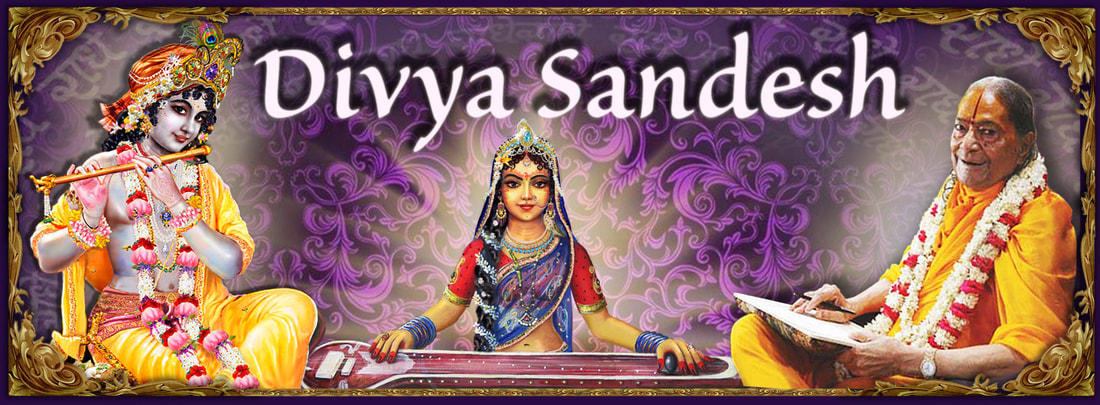Separating Chaff From GrainSunahu Sadhak Pyare - Part 17
|
Loving remembrance, meditation, affectionate thinking, roopadhyan, this is the essence of all devotion. All other ways of worship are helpers to real devotion. Why?
|
मन एव मनुष्याणां कारणं बन्धमोक्षयोः
नारद पुराण, पंचदशी, ब्रह्मबिन्दु पुराण |
mana eva manuṣyāṇāṃ kāraṇaṃ bandhamokṣayoḥ
nārada purāṇa, paṃcadaśī, brahmabindu purāṇa |
"The mind is the reason for either being controlled by Maya or being freed from Maya". If you don’t engage your mind in remembering God, then what will your mind do when your body engages in physical worship? Your mind will remember someone or something of this world and whatever the mind meditates upon that is the object of its worship. And you get the fruit according to that. You are saying “Radhey Radhey” and assuming that is the name of your mother, wife or daughter, then you will not get the fruit of remembering Radha Rani. You will get the fruit of the personality you were remembering. So when taking God’s name, mentally remember that personality. Memorize it by heart. Keep on thinking on this point. This statement will help you till you realize God. That is why apart from remembering God, every other form of devotion is like multiplying with zero.
There are two forms of devotion. One includes the remembrance of God (sasang bhakti) and the other is without the remembrance of God (anaasang bhakti). Listening or chanting the chapters and verses of the Bhagavat, Gita and Ramayan etc. or visiting holy places are worthless unless they are accompanied with remembrance of God. While performing those so called devotional actions God notes down the degree and extent of your material attachments, not the physical acts of worship that you perform.
There are two forms of devotion. One includes the remembrance of God (sasang bhakti) and the other is without the remembrance of God (anaasang bhakti). Listening or chanting the chapters and verses of the Bhagavat, Gita and Ramayan etc. or visiting holy places are worthless unless they are accompanied with remembrance of God. While performing those so called devotional actions God notes down the degree and extent of your material attachments, not the physical acts of worship that you perform.
|
मनेर स्मरण प्राण
|
manera smaraṇa prāṇa
|
Remembrance if the essential part of devotion. As a lifeless body is meaningless, so meditation on the divine form of God is the most essential part of devotion.
When we start to learn the ABCs of devotion, the first lesson is to mentally conceive the divine form of your Lord, and then take His name. Even in this world, when we wish to call out to someone, we first remember his form and then we call his name. Without having a mental image of the person, even in this world we don’t call out to anyone. Hence, Yogdarshan has an aphorism saying that
When we start to learn the ABCs of devotion, the first lesson is to mentally conceive the divine form of your Lord, and then take His name. Even in this world, when we wish to call out to someone, we first remember his form and then we call his name. Without having a mental image of the person, even in this world we don’t call out to anyone. Hence, Yogdarshan has an aphorism saying that
|
तज्जपस्तदर्थ भवानात् ।
योगदर्शन |
tajjapastadartha bhavānāt ।
yogadarśana |
"one should chant God's divine name with the feeling that the name of God and God Himself are one and the same."
So even if you perform thousands of different types of devotion, remembering His Divine form is foremost. You don’t have to take the name of Ram and Shyam even a single time. If someone is deaf, how will he listen to devotional music? If someone is mute, how will chant Radhe Radhe? He will protest and say, “I should receive God realization without the requirement of exerting any effort because I can’t perform this kind of devotion.” So God says, “I don’t want the devotion performed by your ears, eyes or your tongue. I want the devotion practiced by your mind.” Everyone possesses a mind, even trees, birds, animals, bugs all have a mind. God says, “Remember Me even if you don’t utter My name.”
The name is chanted in order to facilitate attaching the mind to God. When you sing His leelas and attributes then your mind gets attached to God. Lovingly attaching the mind to God is the goal. The senses are helpers to the mind. While you are loudly chanting God’s name and singing with the accompaniment of instruments, even if there is a massive accident outside, you won't be able to hear it over the sound of the satsang and thus your devotion remains undisturbed.
Another reason is that some devotees may have less spiritual power while others may have more. When all these devotees sing together, then cumulative spiritual power in the breaths of all devotees helps spiritually elevate all the devotees. But Remembering God’s Divine form is compulsory. Without that, devotion cannot be called devotion. You might find statements like there is no need for devotional sentiments and to only take God’s name because that is enough. Before taking God’s name, a mental image of God's form has to be brought into the mind. Otherwise, if you didn't do this, did you really take God’s name? So remember God mentally and along with that listen to or chant God’s name, whatever you prefer.
So even if you perform thousands of different types of devotion, remembering His Divine form is foremost. You don’t have to take the name of Ram and Shyam even a single time. If someone is deaf, how will he listen to devotional music? If someone is mute, how will chant Radhe Radhe? He will protest and say, “I should receive God realization without the requirement of exerting any effort because I can’t perform this kind of devotion.” So God says, “I don’t want the devotion performed by your ears, eyes or your tongue. I want the devotion practiced by your mind.” Everyone possesses a mind, even trees, birds, animals, bugs all have a mind. God says, “Remember Me even if you don’t utter My name.”
The name is chanted in order to facilitate attaching the mind to God. When you sing His leelas and attributes then your mind gets attached to God. Lovingly attaching the mind to God is the goal. The senses are helpers to the mind. While you are loudly chanting God’s name and singing with the accompaniment of instruments, even if there is a massive accident outside, you won't be able to hear it over the sound of the satsang and thus your devotion remains undisturbed.
Another reason is that some devotees may have less spiritual power while others may have more. When all these devotees sing together, then cumulative spiritual power in the breaths of all devotees helps spiritually elevate all the devotees. But Remembering God’s Divine form is compulsory. Without that, devotion cannot be called devotion. You might find statements like there is no need for devotional sentiments and to only take God’s name because that is enough. Before taking God’s name, a mental image of God's form has to be brought into the mind. Otherwise, if you didn't do this, did you really take God’s name? So remember God mentally and along with that listen to or chant God’s name, whatever you prefer.
|
येन केन प्रकारेण मन: कृष्णे निवेशयेत ।
भक्ति रसामृत सिंधु |
yena kena prakāreṇa mana: kṛṣṇe niveśayeta ।
bhakti rasāmṛta siṃdhu |
|
तस्मात् केनाप्युपायेन मन: कृष्णे निवेशयेत् ॥
भा 1.1.32 |
tasmāt kenāpyupāyena mana: kṛṣṇe niveśayet ॥
bhā 1.1.32 |
By whatever means your mind gets attached to Him, that is what you should do. That is the aim.
|
जप तप नियम योग निज धर्मा । श्रुति संभव नाना शुभ कर्मा ॥
अगम निगम पुरान अनेका । पढ़े सुने कर फल प्रभु एका ॥ तव पद पंकज प्रीति निरंतर । सब साधन कर यह फल सुन्दर ॥ |
jap tap niyam yog nij dharma. shruti sambhav naana shubh karma .
agam nigam puraan aneka. padhe sune kar phal prabhu eka . tav pad pankaj preeti nirantar. sab saadhan kar yah phal sundar |
However much you love God is the indication of how much devotion you have. And love will automatically cultivate through loving remembrance. That is why it is being said,
|
श्रवण कीर्तन स्मरण ही है प्रमुख साधन प्यारे ।
स्मरण ही को साधना का प्राण मानो ॥ |
śravaṇa kīrtana smaraṇa hī hai pramukha sādhana pyāre ।
smaraṇa hī ko sādhanā kā prāṇa māno ॥ |
Listening, singing and remembrance, these three are primary ways of practicing devotion. But remembrance is the life breath of that practice.
Bibliography - Learn more
|
Links of 2-4 related articles to go here
|
Some Pointers to Explore our Literature
Indulge yourself in spiritual material - Click on the images below or the headers
Divya Sandesh
|
Divya Ras Bindu
|
Spiritual Terms
|
|
We would love to hear from you. Please
|
To get notification about our publications please subscribe by entering the information above
|





